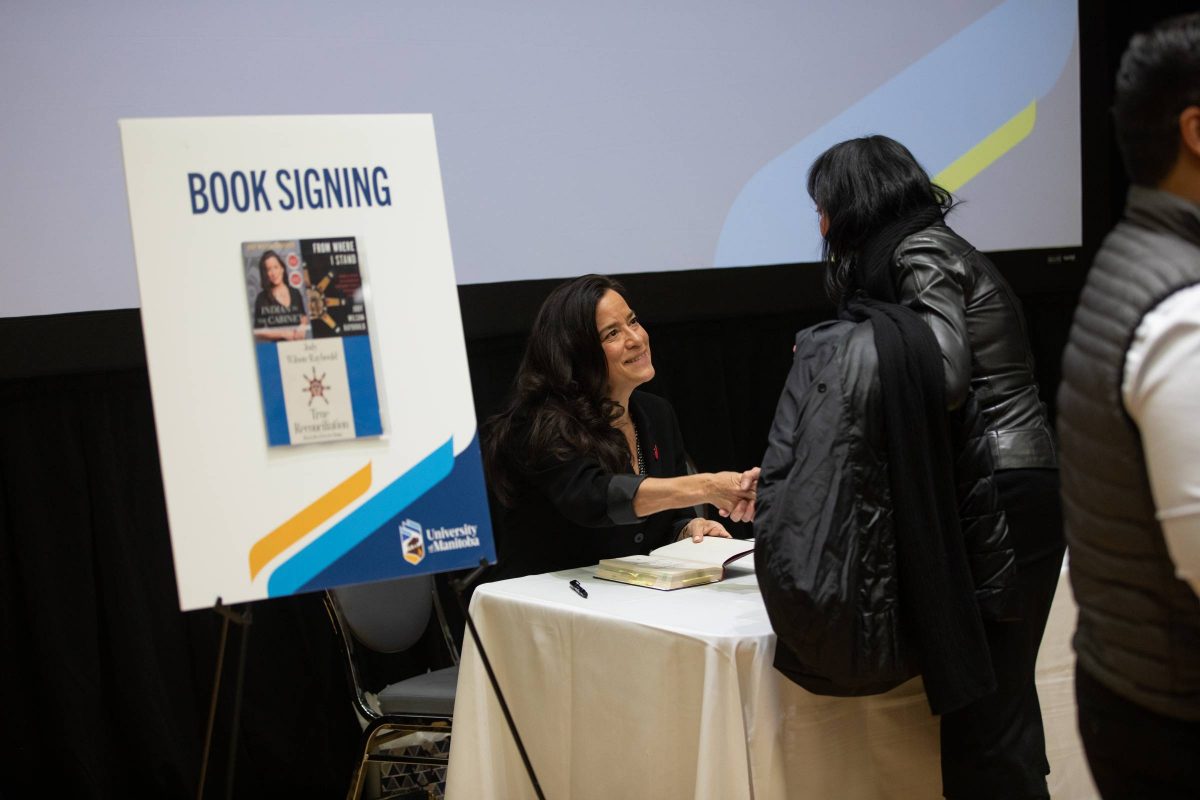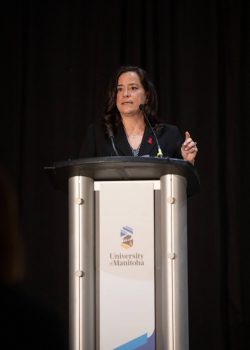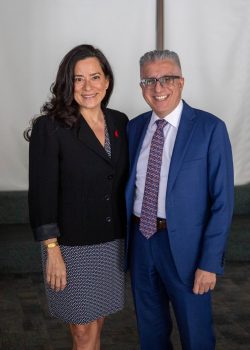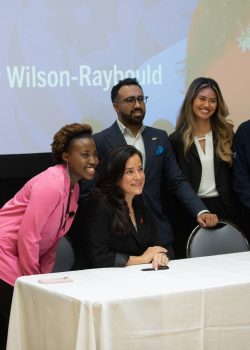
The Honourable Jody Wilson-Raybould meeting guests after the 2024 Robert and Elizabeth Knight Distinguished Lecture at the University of Manitoba.
Former Minister of Justice Jody Wilson-Raybould visits UM
Highlights from the 2024 Knight Lecture
On her way to speak at UM’s Fort Garry campus, the Hon. Jody Wilson-Raybould, a former politician who was the first Indigenous Attorney General of Canada, found herself chatting with her taxi driver about what makes a good leader.

The Honourable Jody Wilson-Raybould.
She could tell the Winnipegger—who introduced himself as Roger—possessed these traits. He opened up about how he never got the chance to pursue university or college but, now in his 60s, feels happy and successful in life since he’s worked hard and has always tried to do the right thing.
“Real leaders act with integrity,” Wilson-Raybould, now a bestselling author, tells UM Today before her talk. “No matter what environment that you’re in: believe in what you say and say what you mean—and then act on what you say. Those are the qualities, for me, of a true leader.”
Roger didn’t recognize his passenger as the former Minister of Justice who made national headlines when she was expelled from the Liberal caucus in 2019 for speaking out against attempted political interference with the legal system in what’s known as the SNC-Lavalin affair. The intense spotlight landed her on every front page and TV screen, “much to my mother’s horror,” Wilson-Raybould candidly shared with the audience of this year’s Knight Lecture.
Several hundred people attended the March 7 event, followed by a Q & A session and book signing of Wilson-Raybould’s latest release True Reconciliation: How to Be a Force For Change. The aim of the Robert and Elizabeth Knight Distinguished Visitor Program is to enhance education at UM by bringing in outstanding thinkers and leaders. The lecture is free to attend and open to students, employees and alumni. This year’s coincided with the lead-up to International Women’s Day.
Wilson-Raybould, a member of the We Wai Kai Nation in British Columbia, comes from a matrilineal society in which descendants trace properties inherited through the female line, with women carrying high-rank knowledge and experience.
“My grandmother used to joke that when it came to the respective roles of men and women in our society, women were simply too busy and too important to be Chiefs.”
Wilson-Raybould was the first woman to be elected as an independent member of Parliament. Her bestselling books include the political memoir “Indian” in the Cabinet: Speaking Truth to Power and From Where I Stand: Rebuilding Indigenous Nations for a Stronger Canada.
She says her father, Bill Wilson, who was among the first Indigenous lawyers to graduate from the University of British Columbia, would describe her as “a bit of a rebel” growing up. She was a kid who courted risk, jumping from trees and stomping out bee hives.
“In order to improve our reality, you have to take a certain amount of risk and you have to be courageous, to step out of that status quo and push for change,” she told UM Today. “And a lot of people fear change. Change is uncomfortable, or speaking up where some people don’t feel comfortable doing so. Being what I like to call ‘an inbetweener,’ trying to bridge divides, is hard.”
She told the audience she just sent her fourth book to her publisher and wouldn’t rule out a return to politics in the future. Here are some other notable takeaways from her UM visit, captured in her own words:

The Honourable Jody Wilson-Raybould and University of Manitoba President and Vice-Chancellor Dr. Michael Benarroch.
The roadblocks she sees to true reconciliation…
“When everything or nearly everything is called Reconciliation, this effectively means the same thing as nothing being reconciliation. Performative reconciliation is easier, costs less and is less risky. But the point is that the real work of true Reconciliation can be hidden from view by the symbolism and the charades, or worse, the symbolism becomes believed to be a substitute for true reconciliation. Performative reconciliation is not relentless and it does not take courage.
One of the legacies of colonialism is the building of visible and invisible barriers and silos between Indigenous and non-Indigenous peoples and between crown governments and Indigenous peoples. We do not understand each other or our ways of talking and viewing the world nearly as much as we need to, nor as much as we think we do. And we often operate and make decisions based on false assumptions rather than real understandings of each other.”
How we can all get involved in Reconciliation…
“Learn our true history and know that there have been many voices that weren’t represented in our traditional history books and what has been taught in the universities…. There’s individuals and Canadians across the board that are becoming more familiar with our true history…. It’s the responsibility of everybody in their own spheres of influence to play the role that they can and to learn and understand. Then, based on that, act in different ways that they have available to them.”
The problem with the federal political system…
“What I found in Ottawa is a reality of how disinterested our leaders and governance system is in building consensus around the best ideas, around searching for the truth and evidence of a situation, and working together. In our politics—and you can take my word for it or not—ideas are not judged on their value or merit. They are judged on by who says them.
If they are said by someone within another party they are, in fact, wrong or bad or dangerous. If they are said by someone within one’s own party they are, in effect, unassailable. Similarly, one is not supposed to think for oneself rather one is to imitate or parrot whatever the party line is. One is never to lead, always to follow. Never call out someone for doing something wrong if that someone is from within one’s own party, and always say someone from another party is doing something wrong even if they’re not. Never speak truth to power, just accept that power is truth.”
How she stays true to herself…
“My litmus test is very simple. When I look at myself in the mirror, at the end of the day, do I see who I am, who I was raised to be? If the image was getting at all blurry I knew that I was not making the right choices. So I focused on keeping that image crisp and clear and that meant making the chose that I did.
When a woman speaks out, pushes back, stands up on principles, or relies on their lived experience, or brings forward actual knowledge and experience, they are easily and reflexively labeled as difficult. Well, if doing all of those things means being difficult, I am simply proud to be difficult every single day of my life.”
 Her thoughts on Indigenous women in leadership roles in post-secondary and politics…
Her thoughts on Indigenous women in leadership roles in post-secondary and politics…
“I don’t think there’s enough yet and we need more women involved…. Women are critical and not only in terms of Indigenous nation rebuilding but also getting involved in post-secondary education. Women bring different perspectives—more fulsome perspectives and approaches to community and social well-being.
I’ve been around tables where I’ve been the only woman or I’ve been the only Indigenous woman and I find, generally speaking, a woman can say something three or four times in a room of men. And then when a man says it, then everybody listens. So the more women that sit around boardroom tables, that sit on the Board of Governors at a university or in the House of Commons, it’s really important—to ensure that other voices are heard.”
What she thinks about a new building for the National Centre for Truth and Reconciliation on campus…
“It’s amazing. What an opportunity…. How can we move forward with Reconciliation? What can people do? The Centre’s a perfect opportunity to learn more, but also honour and respect the records of Survivors and their families. And it’s a place where we will always remember our history and move forward in a way that is respectful.”
Her message to Indigenous students…
“Be proud of who you are and know that you have a right to be here, and you can accomplish anything if you work hard and put your mind to it. And have a plan.”
Nominations for the 2024-2025 Knight Distinguished Visitor
Do you have an idea for someone to nominate as the next Knight Lecturer? Nominations are opening soon! Watch for nomination announcements and check the Knight Lecture website for updates.






